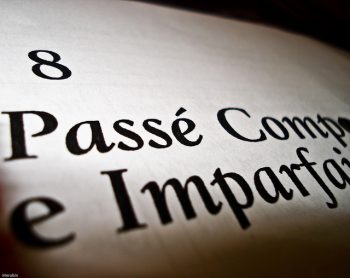Tag Archives: grammaire francaise
How to Pronounce *PLUS* in French Posted by Hichem on Mar 1, 2013
New French learners often get confused about how to properly pronounce some words en français. One such French word is *PLUS.* Indeed, one can sometimes hear French speakers pronounce it as “PLUSS” (with the “s“), and other times as “PLU” (without the “s.”) So, how to tell the difference? L’astuce (the trick) is actually quite easy…
How to Conjugate the French Verb Vivre Posted by Hichem on Nov 13, 2012
“Vivre” (“To Live”) is a must-know French verb. It can be tricky to conjugate, because in some cases it can be confused with the verb voir (to see): “Je vis” (I live) and “je vis” (“I saw”), in which case context becomes your best friend! It is conjugated the same way as revivre (to live something again), survivre…
How to Easily Understand the French “Passé Composé” Posted by Hichem on Nov 1, 2012
We’ll try in today’s post to shed some light on the different uses of a special French grammatical tense called “le passé composé” —That way, you won’t be feeling too “tense” about it anymore! Actually, linguists nowadays prefer to speak of a “tiroir verbal” (literally “verbal drawer”) instead of un temps grammatical. And what was called for…
French Grammar vs. English Grammar: Passive Voice Exceptions Posted by Hichem on Oct 4, 2012
It is an undeniable fact: English grammar is way more flexible (and in a way more “relaxed”) than its French counterpart. But that, of course, is not necessarily a French disadvantage: It is no pure coincidence that French has always been celebrated as “the language of clarity and precision”, and was for many centuries the…
How to Understand French Pronominal Verbs Posted by Hichem on Sep 27, 2012
Les verbes pronominaux are usually easily recognizable: They are accompanied by a pronoun which agrees with the subject. These pronouns can be: me te se nous vous For example, take the verb se nourrir, which is another way to say manger (to eat), similar to the English verb to nourish, to feed (oneself.) You would say…
How to Conjugate the French Verb Pardonner (To Forgive) Posted by Hichem on Sep 7, 2012
There are many ways to say “I am sorry” in French: The quickest way would be “pardon” (“sorry”), “pardonnez-moi” (“forgive me”), or “je suis désolé” (“I am sorry.”) But you can also say “je vous demande pardon” (“I apologize”), “je vous présente mes excuses“, “Je vous prie de m’excuser” (“I beg your pardon”), or in…
French Grammar: Transitive Verbs of Two Objects Posted by Hichem on Aug 20, 2012
You are already familiar with transitive verbs, meaning verbs that require an object. Now meet the less known breed called “ditransitive verbs.” It may sound complicated at first, but once you know what it stands for, it suddenly becomes très facile: As their name says, these are verbs which need one direct object and one additional object introduced by…








